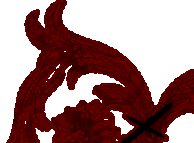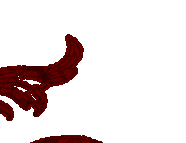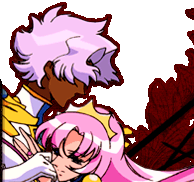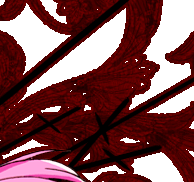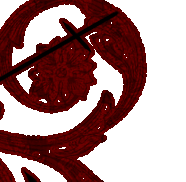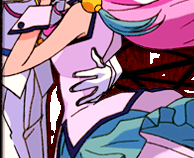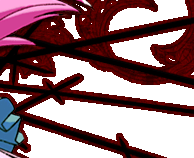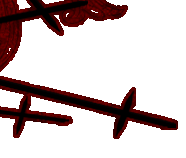
This analysis
was donated by Maarika. 
Non-verbal communication forms a very important part of communication that should never be ignored or left out of consideration when trying to interpret someone's message. The following analysis is based on the anime series called Revolutionary Girl Utena, and because it is made by Japanese it also deals a bit with the Japanese culture. Although, it mostly focuses on non-verbal communication it also explains some aspects of politeness.
The use of prototypes (and also archetypes and stereotypes) is what greatly helps any artist to pass on their message. Archetypes are quite similar to prototypes, but archetypes are usually idealised models of a concept or a person, whereas a prototype does not have to be idealised in any way. We do not know what an artist might be thinking or what they had in mind when they created something. Their work itself is supposed to represent their message. Since there are basically unlimited possibilities of expressing something (as well as interpreting it), the only way the message can (correctly) get through is when the creation has something recognisable and familiar in it for the viewers. For instance, when we take a prototype of a 'prince', lots of people may get a mental image of a handsome noble man on a white horse. People from Asian or African cultures, for example, would probably get a bit different mental picture of a prince. Perhaps it is also important who brings up the prototype in their creation (or conversation, it works there as well) because the we might try to guess the author's own prototype and therefore be biased by that. In either case, when we think of a prince we do not usually picture a pink-haired girl who goes by the name Utena (See image). Regardless, there is something undoubtedly princely about her. If we were to list elements that would indicate the 'prince' prototype, then one could think of clothing similar to the one in the picture. Also, a sword is perhaps something that we imagine a prince would have. But a girl being a prince? This is where the message behind this image can become very ambiguous. Naturally, one would imagine a girl as a princess, rather than a prince. Does this mean a girl could be a prince? In fact, not knowing anything else about Utena and just looking at this picture, might suggest that a girl not only can be prince, but that she is one. The “girl” prototype would probably consist of elements like “dress/skirt”, “long hair”, “young”, etc. - something feminine. We break some rules by taking a masculine prototype and merging it with something feminine (this is yet another thing that makes Utena revolutionary). And this is exactly the message behind this princely looking girl. Of course, not everyone would get this exact message if they saw that picture, but in most cases it should still strike as something rather unusual or different from what the viewer might have expected. Naturally, prototypes differ between people and cultures, but they can still be used in a more symbolic way (as well as stereotypes and archetypes) such as in the example above.
Non-verbal communication is a very efficient means of getting the message across. For instance, just by wearing certain clothes, one can convey something without actually using any words. Utena is yet another example of how this works. She is just a normal student at Ohtori Academy and as a rule, students are supposed to wear school uniforms in Japan. Utena wears a boy's uniform despite being a girl. This draws a lot of attention: the teachers do not not approve of it yet her peers find it cool. Utena's reason for dressing like that is her wish to become a prince, so this attire is part of her self-image. It is important to note that she wears the clothes for herself, rather than to express something to others, and as a result, a great number of people start perceiving her as a princely character, too. One can wear something different as a sign of protest or to be accepted in certain social groups but in other cases people just do it for themselves. The clothing is quite significant, because when Utena loses a duel she starts doubting herself and stops wearing the boy's uniform altogether. The sailor uniform that all the other girls wear is supposed to be normal. In reality, however, this outfit has no connection to Utena's self-image so it is not 'normal' by her standards. It is important to note that this sort of clothing only works in a specific context. If Utena was to wear clothes like that outside the Academy, she could make an impression of a cross-dresser or a cosplayer. Cosplay is popular in Japan, but it is still done in specific places, thus it might leave an entirely different impression than the one that was originally meant. Utena has a rather dashing and noble image while being at the Academy where everyone is obsessed with princes and princesses which is why she fits in the given context, elsewhere she would most likely seem absurd.
Japanese culture has a rather unusual way of politely addressing other people. Certain honorifics are attached to the end of the name of the person who is being addressed. Not using an honorific can be considered very impolite or even insulting if you do not have permission to omit it. Honorifics add a great deal of distance between people (excluding certain honorifics that are used to show familiarity). Anthy uses the honorific -sama to address the duel champion. This is a formal honorific that shows great respect. When Utena wins her first duel, the previous duel champion, Saionji, is left aside, and along with that Anthy no longer addresses him by -sama. In fact, she quite deliberately uses the honorific -senpai for Saionji (Saionji is an upper-classman to her, so this is a proper way of addressing him). Senpai is also a respectable honorific (used for people of higher rank/position etc.), but not as honourable as -sama is. Thus, in this context, Anthy's usage of “Saionji-senpai” can be considered insulting. Moreover, this act can also be viewed as a way of showing dominance. Whoever is engaged to the Rose Bride is basically the master, and the nature of the Rose Bride is to be submissive. Saionji did not only lose the Rose Bride, but also all the power he had over her. Utena, on the other hand, does not approve of any of this and she insists on Anthy not addressing her as “Utena-sama” because they are both of the same age and social position. By the time Utena lost her duel, she had started thinking of Anthy as a close friend, despite Anthy's persisting usage of the -sama honorific. After losing the duel, Anthy starts addressing Utena with -san (this is not used with friends), which puts quite a lot of emotional and psychological distance between them.
The way people use their power (and symbolic capital) can also make a difference in communication. In episode 21 of there is a scene where Nanami keeps talking on and on while a fellow student tries to tell her something. Nanami does not appear as someone who takes very short in-turn pauses while talking and yet, in that specific scene she completely left someone out of the conversation. The main reason for that is the position she believes herself to be in. [Note: in another aspect, this can also be interpreted as Nanami being extremely obsessed with Touga so she ignores everything and everyone else.] She sees herself as superior to her peers because her brother is a popular figure at the Academy. This is definitely an abuse of power since Nanami has several lackeys and slave-like servants who would never associate with someone like her if it were not for her brother (so the person who truly holds the symbolic capital is actually not Nanami).
Nanami has set distinct lines between herself and her brother and all others who she considers inferior. She keeps her brother only to herself and refuses to share him with others, and all those who dare to cross these lines will pay for it. This is what happened to Keiko who got a bit too close to Touga. As a revenge, Nanami broke off all her ties with her. It even went so far that Keiko's own friends (who were also looking up to Nanami) stopped associating with Keiko. When Keiko pleads with them to help her talk to Nanami again, one of them says, “Do you hear something?”, to which the other replies “Not a thing.” Keiko's friends acted out of social pressure, or out of fear of something like this happening to them as well. By her friends' reaction Keiko easily picked up the message that there was no help to be expected. Still, their attitude towards Keiko was very cruel. This sort of silent treatment can really devastate a person mentally and it can also be considered an act of symbolic violence on Nanami's part. Nanami does not directly tell anything to Keiko's friends, but she has enough power over them to influence them.
Body language plays a big part in communication and it works subconsciously, so we might not even be aware of what kind of signals our body sends when we are talking to someone face-to-face. It is possible to control body language to some extent and deliberately use it for a specific purpose, but that takes quite a lot of effort and might even seem unnatural if it is not done correctly. Most people also have certain habitual gestures in their body language which do not necessarily mean anything. For example, there are people who often fold their arms out of a habit, rather than to express refusal to be open with other (thus, it would be a mistake to interpret it as such). In those cases, the person in question could very well be open-minded and friendly, despite their body language. Still, body language can convey a rather clear-cut message about the person or their attitude. For example, Anthy normally has her hands clasped in front of her while being with other people. And it does not really matter with who. Clasping hands like that makes her look rather reserved and submissive. This is definitely not an open posture. Moreover, it clearly sets the roles about who is the more dominant one in the conversation. Anthy acts as if everyone else around her has power over her, but in reality she has power over other people by passively manipulating them. What is important is that the other people do not see this. This gesture could also have become a habitual one for Anthy but even then others will interpret and take it as a message. Unless we know the other person very well we might often be making misjudgements like this that.
There is another interesting aspect to our body language, namely proxemics. Edward Hall's concept of proxemics is tightly connected to our cultural heritage, and the size of our personal space varies in different social situations. Individualists need much more physical distance between other people than collectivists do. Japanese culture appears to be more collectivistic rather than individualistic, thus people should be quite comfortable with smaller personal spaces. This could also be part of the big city mentality because Japan is very densely populated. In any case, knowingly invading someone's personal space can be interpreted as an act of showing dominance, but this is not all of it. When the distance between people becomes very short, whatever conversation they are having becomes more personal. Likewise, it is easier to be impersonal if the distance is great. Additionally, all face threatening acts are amplified at a shorter distance. For example, Touga and Akio are the biggest playboys on the campus, and their success in becoming popular is mainly thanks to the way they handle their (physical) relationships with others. For example, Touga quite often stands very close to whoever he is speaking to. But he does not stop there. If he has set his eyes on someone he proceeds by adding more contact, often times he plays with the other person's hair, leans closer, or positions himself so that the other person would not be able to get away very easily. In episode 36, Touga pins Utena against a tree and partially blocks her way with his arm so that she could not escape. Normally, Touga does not show this much dominance but in that particular scene he challenged Utena to a duel after making sure that the close proximity would work in his favour. As a result, Utena had no other choice but to accept the challenge. Of course, Touga's way of invading Utena's personal space and his possessive body language were not the only factors why he was able to clearly get his message across (and also the desired answer), but they certainly added more weight to the speech act.
In the end, it is not only what is said but also how that matters, and this 'how' can often determine the course of the conversation or whether or not the message is received at all. This is why non-verbal communication plays such an important role in communication.
 |

